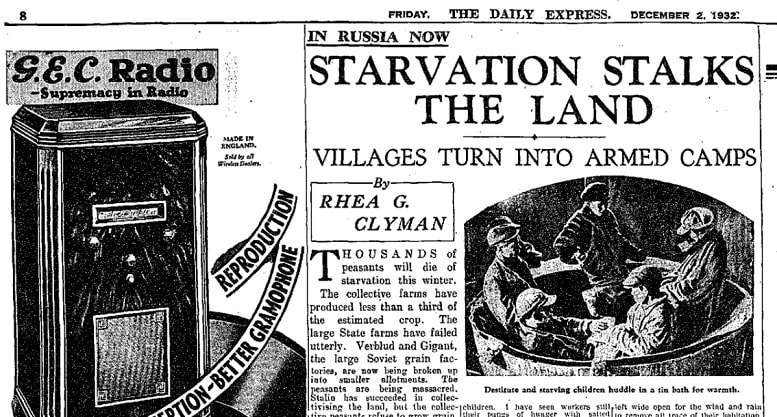|
Like most people, until recently I had never heard of Rhea Clyman. But now that I have, I stand and applaud her. Her story deserves to be more widely known.
Clyman was a young Canadian journalist who broke through so many boundaries of her age. Born in 1904 in Poland to a poor Jewish family, she and her family emigrated to Toronto two years later. Here she lost part of her leg in a road accident as a young child. Forced to leave school after her father’s early death to help support her family, she worked as a child labourer in a factory, but refused to let poverty and disability stand in her way. She augmented her meagre schooling by teaching herself in the hope of one day becoming a journalist – in itself an unusual career for a girl at that time, let alone one of her background. In the 1920s she moved from Canada to New York and then to London, Paris and Berlin, where she witnessed and reported on the rise of Hitler. In 1928, aged just 24, she headed east again, to Moscow, where she learnt Russian and began working as a freelance reporter for the Daily Express in London and the Toronto Evening Telegram. She lived with a Russian family and travelled unaccompanied, experiencing the hazards of daily life under Stalin. Her travels took her north to see first hand the labour camps of Karelia. Her Russian boyfriend had been arrested and sent to Siberia for dealing in foreign currency. On a three-week road trip through Ukraine in 1932, Clyman witnessed and exposed one of the most shameful events of the 20th century, the deliberate mass starvation of millions of Soviet citizens in Ukraine, an event now commemorated as the Holodomor. While other foreign journalists reported on the famine, few saw what Clyman had seen, for most were only able to visit the areas affected by the famine as part of an organised group whose experiences were limited to what the regime allowed them to see. Clyman wrote of seeing starving peasants on the streets of Kharkiv, where children were eating grass to stay alive and thousands were executed as punishment for the theft of a few ears of corn. On the same trip, she drove through the Donbas region of eastern Ukraine, where today the war between Ukrainian troops and Russian separatists lingers on, reporting on the tough conditions suffered by miners and their families. Eventually she reached Tbilisi, Georgia, where the secret police were waiting for her. Clyman was arrested by the OGPU – a precursor to the KGB – accused of spreading disinformation (what today we would label Fake News) and forced to leave the Soviet Union. News of her expulsion was carried by hundreds of newspapers around the world. The Soviet authorities denied the existence of the famine, and it is thanks to foreign journalists like Clyman that the Holodomor became public. It is impossible to accurately gauge how many people died of starvation in central and eastern Ukraine in 1932-33, but historians estimate the figure was between 3 and 10 million, and the Holodomor is widely recognised as genocide and a crime against humanity. From London, Clyman continued to publish articles about her trip through what she described as the “Famine lands of Russia” and the atrocities of Stalin’s dictatorship until departing once again for Germany to report on the rise of Hitler and the start of World War II. As a Jew writing about Nazi anti-Semitism, it was too dangerous for Clyman to remain in Germany. She escaped to Amsterdam by plane with a group of refugees, surviving a deadly air crash in the process. The rest of her career was spent in Montreal and New York, where she died in 1981. Rhea Clyman is now the subject of a film, Hunger for Truth. Watch a trailer here https://vimeo.com/ondemand/hungerfortruth And her story will soon feature in a book by Jars Balan, director of the Canadian Institute of Ukrainian Studies at the University of Alberta.
0 Comments
Leave a Reply. |
Keeping stories aliveThis blog aims to discuss historical events relating to the Jewish communities of Ukraine, and of Eastern Europe more widely. As a storyteller, I hope to keep alive stories of the past and remember those who told or experienced them. Like so many others, I am deeply troubled by the war in Ukraine and for the foreseeable future, most articles published here will focus on the war, with an emphasis on parallels with other tumultuous periods in Ukraine's tragic history. Archives
March 2024
Categories
All
|

 RSS Feed
RSS Feed
